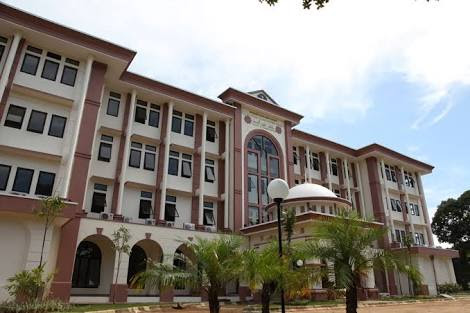IMPLEMENTATION OF TONGKONAN TORAJA HOUSE CARVINGS ON TRANSFORMATION GEOMETRY MATERIAL IN CLASS XI SMA NEGERI 2 NORTH TORAJA
IMPLEMENTASI UKIRAN-UKIRAN RUMAH TONGKONAN TORAJA PADA MATERI GEOMETRI TRANSFORMASI DI KELAS XI SMA NEGERI 2 TORAJA UTARA
Abstract
This research implements the carvings of the Toraja Tongkonan house on the transformation geometry material in class XI SMA Negeri 2 Toraja Utara. The purpose of this study was to determine the learning outcomes and student activities in implementing Tongkonan house carvings on the Transformation Geometry material. The research method used is quantitative. Data collection using observation, pre-test, and post-test sheets. An essay test with five question items was used in this study as an instrument. The research sample was a class XI science high school student. Sampling Technique with cluster random sample. This research was conducted at SMA Negeri Toraja in the even semester of 2021. Data analysis techniques are carried out with descriptive statistics in the form of percentage analysis for student activities and student learning outcomes. The results showed that (1) the average score of student activity in learning was 4.05 which can be categorized as active, and (2) student learning outcomes can be categorized as good as evidenced by the average score of student learning outcomes being 76.35.
Downloads
References
Achor, E. E., Imoko, B. I., & Uloko, E. S. (2009). Effect of ethnomathematics teaching approach on senior secondary students’ achievement and retention in Locus. Educational Research and Reviews, 4(8), 385–390. Retrieved from https://papers.ssrn.com/sol3/papers.cfm?abstract_id=2618193.
Angkowo, R., Djahiri, K. A., & Safitri, A. (2007). Optimalisasi media pembelajaran: mempengaruhi motivasi, hasil belajar dan kepribadian. Jakarta: Grasindo.
Arisetyawan, A. (2015). Etnomatika masyarakat baduy. Jawa Barat: Universitas Pendidikan Indonesia Press.
Borba, M. C. (1992). Teaching mathematics: Ethnomathematics, the voice of sociocultural groups. The Clearing House: A Journal of Educational Strategies, 6(65), 332–333. https://doi.org/10.1080/00098655.1992.10114182.
Fouze, A. Q., & Amit, M. (2018). Development of mathematical thinking through integration of ethnomathematic folklore game in math instruction. Eurasia Journal of Mathematics, Science and Technology Education, 14(2), 617–630. https://doi.org/10.12973/ejmste/80626.
Kalinec-Craig, C., Prasad, P. V, & Luna, C. (2019). Geometric transformations and Talavera tiles: a culturally responsive approach to teacher professional development and mathematics teaching. Journal of Mathematics and the Arts, 13(1–2), 72–90. https://doi.org/10.1080/17513472.2018.1504491.
Lembang, S. T., Baan, A., Dewi, R., & Palipangan, F. B. (2022). The analysis concept of integers counting operations in traditional Toraja games Si Goal and Si Patte’. AIP Conference Proceedings, 2542(1), 1–10. https://doi.org/10.1063/5.0104500.
Marsigit, Condromukti, R., Setiana, D. S., & Hardiarti, S. (2014). Pengembangan pembelajaran matematika berbasis etnomatematika. Prosiding Seminar Nasional Etnomatnesia, 20–38.
Palhares, P. (2012). Mathematics education and ethnomathematics. a connection in need of reinforcement. REDIMAT - Journal of Research in Mathematics Education, 1(1), 79–92. https://doi.org/10.4471/redimat.2012.04.
Pujiadi. (2016). Guru pembelajar modul matematika SMA (kurikulum matematika 2 dan pemanfaatan media pembelajaran). Jakarta: Direktorat Jenderal Guru dan Tenaga Kependidikan.
Puspadewi, K. R., & Putra, I. G. N. N. (2014). Etnomatematika di balik kerajinan anyaman Bali. Jurnal Matematika, 4(2), 80–89. https://doi.org/10.24843/JMAT.2014.v04.i02.p47.
Rohaeti, E. E., Bernard, M., & Primandhika, R. B. (2019). Developing interactive learning media for school level mathematics through open-ended approach aided by visual basic application for excel. Journal on Mathematics Education, 10(1), 59–68. https://doi.org/10.22342/jme.10.1.5391.59-68.
Rosa, M., & Orey, D. (2016). Humanizing mathematics through ethnomodelling. Journal of Humanistic Mathematics, 6(2), 3–22. https://doi.org/10.5642/jhummath.201602.03.
Silalahi, U. (2018). Metodologi analisis data dan interpretasi hasil untuk penelitian sosial kuantitatif (N. F. Atif (ed.); Cetakan ke). Bandung: Refika Aditama.
Unlu, M., Ertekin, E., & Dilmac, B. (2017). Predicting relationships between mathematics anxiety, mathematics teaching anxiety, self-efficacy beliefs towards mathematics and mathematics teaching. International Journal of Research in Education and Science, 3(2), 636–645.
Wahyuni, A., Tias, A. A. W., & Sani, B. (2013). Peran etnomatematika dalam membangun karakter bangsa. Makalah Seminar Nasional Matematika Dan Pendidikan Matematika, 1, 114–118.
Warin, J. (2019). Conceptualising the value of male practitioners in early childhood education and care: gender balance or gender flexibility. Gender and Education, 31(3), 293–308. https://doi.org/10.1080/09540253.2017.1380172.
Wulandari, I. A. P. A., & Puspadewi, K. adek R. (2016). Budaya dan implikasinya terhadap pembelajaran matematika yang kreatif. Jurnal Santiaji Pendidikan, 6(1), 31–37.
Zulkardi. (2002). Developing a learning environment on realistic mathematics education for indonesian student teacher (doctoral disertation, university of twente, enschede). (Thesis University of Twente, Enschede).
Copyright (c) 2022 Suri Toding Lembang, Kristanto, Daud Rodi Palimbong, Chelin Dion Patimang, Ovalin Paseon, Yenni Pasomba

This work is licensed under a Creative Commons Attribution 4.0 International License.

